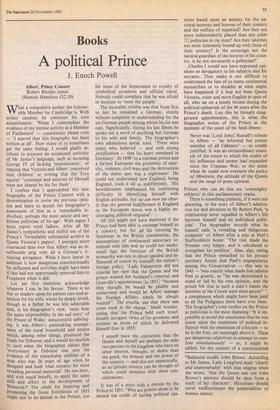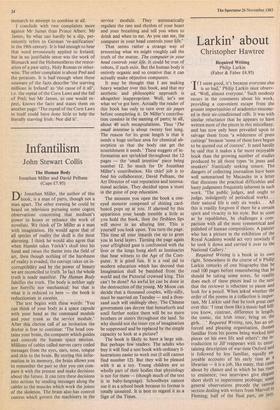Books
A political Prince
J. Enoch Powell
Albert, Prince Consort Robert Rhodes James (Hamish Hamilton £12.50)
What a compulsive author the honour- able Member for Cambridge is. With artless candour he confesses his own astonishment: 'When I contemplate the evidence of my intense activity as a Member of Parliament' — constituents please note — 'I marvel that this biography has been written at all'. How many of us sometimes
get the same feeling. I would gladly at- tribute to pressure an occasional curiosity of Mr James's language, such as accusing George IV of lacking 'uxoriousness', or relating that Victoria and Albert 'conceived nine children' or writing that the Tory squires' contempt and mistrust of Disraeli were not shared by his for them'.
I confess that I approached this new biography of the Prince Consort with a determination to revise my previous opin- ion and learn to accept the biographer's assessment of him as a 'remarkable in- dividual, perhaps the most astute and am- bitious politician of his age'. With regret I must report total failure. After all Mr James's sympathetic and skilful use of the Prince's 'formidably substantial archive in Queen Victoria's papers', I emerged more convinced than ever that Albert was an in-
sufferable prig with all a German's ir- ritating arrogance. What I have learnt in
addition is how dangerous constitutionally his influence and activities might have been if fate had not opportunely removed him to Frogmore when it did.
Let me first therefore acknowledge whatever I can in his favour. There is no slur or shadow upon his patient care and at- tention for his wife, whom he deeply loved, though as a father he was less admirable and, in his biographer's view, 'must bear the main responsibility in the sad story' of the Prince of Wales' unsuccessful upbring- ing. It was Albert's painstaking manage- Ment of the royal household and estates which, among other things, produced the funds for Osborne; and it would be churlish to cavil when the biographer claims that everywhere at Osborne one sees the evidence of the remarkable abilities of a man who was 26 years of age when he designed and built what remains his most revealing personal memorial'. He was later, and with equal benefit, to apply the same skill and effort to the development of Balmoral.* The credit for inspiring and Promoting the Great Exhibition of 1851 Ought not to be denied to the Prince, nor his sense of the importance to royalty of symbolical occasions and official travel. Nobody could complain that he was afraid or hesitant to 'meet the people'.
The incurable trouble was that from first to last he remained a German, utterly without sympathy or understanding for the un-German people among whom his lot was cast. Significantly, during his last illness he spoke not a word of anything but German to his wife and family. The biographer's own admissions speak loud. 'There were many who believed — and with strong justification — that his heart remained in Germany'. In 1848 `to a German prince and a fervent European the proximity of anar- chy, violence, civil wars and the destruction of the status quo was a nightmare'. He could not understand how England, being England, took it all so indifferently. 'His bewilderment emphasised his continuing difficulty in identifying himself with English attitudes, but we can now see clear- ly that the general indifference in England to the European storm was a highly en- couraging political response'.
All this might not have mattered if the Prince had been able to envisage himself as a consort; but for all his tutoring by Stockmar in the British constitution, the assumptions of continental autocracy re- mained with him and he could not under- stand that the function of the British monarchy was not to direct (guided and in- fluenced of course by himself) the nation's foreign policy. 'Lady Palmerston did not conceal her view that the Queen and the prince wanted her husband's removal and Granville's appointment [in 1851] "because they thought he would be pliable and subservient and would let Albert manage the Foreign Affairs which he always wanted". The trouble was that there was some truth in the charge.' Small wonder, seeing that the Prince held such insuf- ferably arrogant views of his goodness and wisdom as those of which he delivered himself thus in 1855:
I myself have the conviction that the Queen and myself are perhaps the only two persons in the kingdom who have no other interest, thought, or desire than the good, the honour and the power of the country — and this not unnaturally, as no private interest can be thought of which could interfere with these con- siderations.
It was of a piece with a minute by the Prince in 1851: 'Why are princes alone to be denied the credit of having political opi- nions based upon an anxiety for the na- tional interests and honour of their country and the welfare of mankind? Are they not more independently placed than any other [I] politician in the state? Are their interests not most intimately bound up with those of their country? Is the sovereign not the natural guardian of the honour of his coun- try, is he not necessarily a politician?'
Charles I would not have expressed opi- nions so derogatory to his subjects and his servants. They make it not difficult to understand the fate of so many continental monarchies or to shudder at what might have happened if it had not been Queen Victoria, wiser and more English in spite of all, who sat on a lonely throne during the political upheavals of the 40 years after the Prince's death. Lest this be thought exag- gerated apprehension, this is what the biographer writes of the Prince at the moment of the onset of his fatal illness: Never was [Lord John] Russell's tribute to Albert — 'an informal but potent member of all Cabinets' — so totally justified. It was an extraordinary exam- ple of the extent to which the reality of his influence and power had expanded since the Crimean War, to the point when he could now overturn the policy of Ministers, the attitude of the Queen and the surge of press opinion.
Princes who can do that are 'overmighty subjects' in this parliamentary realm.
There is something pathetic, if it were not alarming, in the story of Albert's admira- tion for and devotion to Sir Robert Peel, 'a relationship never equalled in Albert's life between himself and an individual politi- cian'. The biographer records what he himself calls 'a revealing and dangerous comment' of Albert after a stay at Peel's Staffordshire home: 'The visit made the Premier very happy, and is calculated to strengthen his position'. Alas, alas, seeing that the Prince remarked to his private secretary Anson that Peel's unpopularity among the Conservatives — this was in 1843 — 'was exactly what made him admire Peel so greatly, EIS "he was determined to stand or fall by his own opinion, and the prince felt that in such a man's hands the interests of the Crown were most secure" a compliment which might have been paid to all the Polignacs there have ever been. The biographer's own verdict on the Prince as politician is the most damning: 'It is im- possible to avoid the conclusion that he was intent upon the maximum of political in- fluence with the minimum of criticism — to be in the fray, yet seemingly above it. These are dangerous objectives to attempt to com- bine simultaneously' — or, it might be added, for the consort of a constitutional *Balmoral recalls John Brown. According to Mr James, Lady Longford dealt 'clearly and unanswerably' with that enigma when she wrote, 'that the Queen was not John Brown's mistress should be clear from a study of her character'. Historians should never underestimate the potentialities of human nature.
monarch to attempt to combine at all.
I conclude with two complaints more against Mr James than Prince Albert. Mr James, by what can hardly be a slip, per- sistently refers to German 're-unification' in the 19th century. It is bad enough to hear that word erroneously applied to Ireland; but in no justifiable sense was the work of Bismarck and the Hohenzollerns the restor., ation of a past unity, Holy Roman or other- wise. The other complaint is about Peel and the potatoes. It is bad enough when those unaware of the facts describe 'the starving millions in Ireland' as 'the cause of it all', i.e. the repeal of the Corn Laws and the fall of Peel; but Mr James, as one would ex- pect, knows the facts and states them on another page: 'The repeal of the Corn Laws in itself could have done little to help the literally starving Irish. Nor did it'.















































 Previous page
Previous page